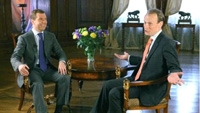UK privacy injunction case may mark turning point for European media restrictions
The professional video industry's #1 source for news, trends and product and tech information. Sign up below.
You are now subscribed
Your newsletter sign-up was successful

European regulations over privacy in reporting have increasingly been brought to attention after a series of high-profile incidents and cases in the last year. The issue has become increasingly relevant for emerging Internet TV services that are creating a global market for content distribution and consumption within which Europe’s rather strict rules over protection of privacy are out of step with other regions, particularly the United States.
The latest case emerged last week when prominent BBC journalist Andrew Marr dramatically lifted a so-called super injunction relating to an extramarital affair he had eight years earlier. Marr admitted to being embarrassed by the super injunction granted by a judge in 2008 in response to his request to protect the privacy of the individuals concerned.
Marr said, "I did not come into journalism to go around gagging journalists."
A super injunction is a court ruling that not only prevents reporting of a specified event, usually relating to an individual, but also prohibits any mention that such a ruling has been made at all. The idea was to ensure that details of an event could not leak out in small degrees through knowledge that a person had taken out an injunction at a particular time, but it has become criticized for excessive throttling of the media as a whole. This became apparent when a super injunction was used to prevent reporting of a draft confidential report about a toxic waste incident in West Africa, which clearly was in the public interest and protected no individual’s personal freedom.
Now the Andrew Marr case has coincided with UK Prime Minister David Cameron arguing that UK privacy over reporting in the media has lurched beyond the control of the government into the hands of judges appearing to act on behalf of the individuals concerned at the expense of freedom of speech, despite being supposedly neutral.
"The judges are creating a sort of privacy law,” said Cameron, adding that in a parliamentary democracy, parliament should decide how much protection we want as a nation. “So I am a little uneasy about what is happening."
Similar unease has been voiced by the European Union (EU) and also the European Broadcast Union (EBU) with reference to a number of other states among the 27 EU member countries. France has been singled out for criticism because its laws are among the most restrictive in Europe, giving politicians and public figures greater protection than elsewhere against intrusion into their financial as well as personal affairs.
The professional video industry's #1 source for news, trends and product and tech information. Sign up below.
Italy too has experienced increasing criticism during the tenure of Prime Minister Silvio Berlusconi, culminating in a weeklong visit by the International Press Institute (IPI) in November to investigate the level of reporting freedom in the country. The IPI met with media stakeholders, politicians and government representatives and identified particular concerns about TV news reporting. The issues arose from Berlusconi’s strong position in the media, owning three of the country’s seven TV channels as well as several leading newspapers, and exerting political influence over Italy’s public broadcaster RAI.
The result of greater constraints over press freedom have ensured that some political leaders in France, Italy and elsewhere have been able to ride out financial and other scandals that would bring them down in the United States, and at least until now in the UK. In the UK, David Cameron is trying to wrestle control over media freedom back to the government from the judiciary. But in Italy, and in some other EU countries such as Hungary, it has been the government that has been guilty of restricting freedom for its own ends. The cases show that the EU has yet to establish a clear framework governing media freedom of the sort that exists in the United States, where the Constitution's First Amendment enshrines freedom of the press.
